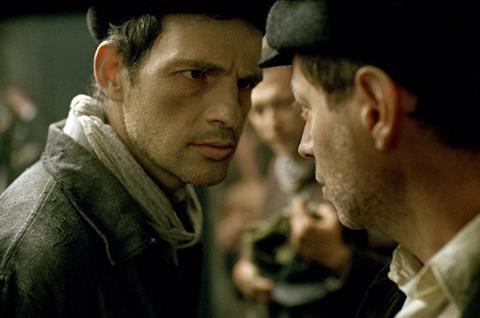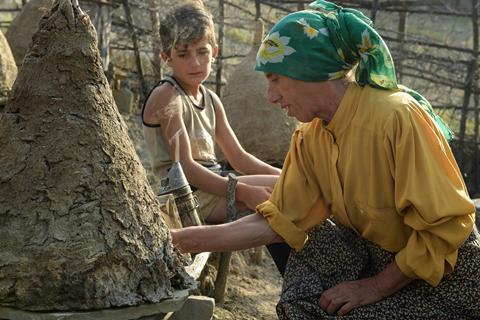
“We have returned to our pre-pandemic numbers,” says Masa Markovic, head of industry at the Sarajevo Film Festival of the 1,000 or so accredited industry guests expected in town this week for CineLink Industry Days.
Launched in 2003, CineLink Industry Days has become the key industry event for filmmakers young and old in Southeastern Europe. It has its own coproduction market, works in progress screenings, a focus on documentary and an Avant Premiere Lab debating the pressing issues of contemporary film exhibition and distribution.

CineLink boasts a strong record in supporting films that have gone on to win prizes at major festivals and sell around the world. Successes to have come through CineLink include Laszlo Nemes’ Oscar winner Son Of Saul (2014) and Florin Serban’s Silver Bear winner, If I Want To Whistle I Whistle (2010). The event has talent development strands, events dedicated to drama series and talks debating issues affecting filmmakers in Southeastern Europe.
There could have yet been more industry visitors this year but Markovic and her team want the event to retain its intimacy. “It’s this sense of familiarity and that you can meet anybody you want to meet,” she says of the CineLink Industry Days vibe.
Careful curation
Some 150 producers, funders, and sales agents from more than 40 countries will be poring over new projects in CineLink’s co-production market. It is showcasing 11 feature-length fiction projects - fewer than you’d find in co-production events at festivals like Rotterdam or Berlin.
“The core idea about CineLink is curation…we feel that we can offer more to projects when the numbers are relatively small,” says Markovic, who took over as head of industry last year after working in the section for 15 years.
She also points out that CineLink offers “the highest number” of financial awards of any co-production event. (Last year saw the addition of a new prize, the Female Voices CineLink Award worth €10,000 to add to the various other prizes already on offer).
It’s a point of principle that around 20% of the visitors will always be “newcomers” at an early point in their careers. “It is the core of CineLink, the reason for its relevance for 20 years…the bottom line of the festival, if you need to sum it up, is discovery.”
Emerging talents
The industry head describes the event as “a motor and generator” for young professionals. “And it’s not that we are only taking place for seven days during August. It is a whole range of activities we are organising throughout the year in order to present projects and to nurture the talent to come.”
For example, CineLink has a longstanding partnership with Berlinale Talents. The Talents Sarajevo strand was established in 2006. Through this, 50 promising young emerging film professionals - from editors and cinematographers to directors and actors - come to the festival and get both to learn and to network.
The aim is to keep supporting these talents for four or five “crucial” years as they establish their careers, put their early projects into production and then screen them at festivals.
Last year saw the launch of a CineLink Producers’ Lab, a networking and training initiative for 12 emerging producers at early stages of their careers. Markovic talks of allowing them to “dive into the CineLink experience to create their network of peers.”
“Working with so many filmmakers for so many years, we have noticed that one of the most fragile periods of their careers is when you have a first successful film and you need to do a second film. This moment between first and second film we have addressed with having directors attending Ponta Lopud,” she says of the event on a small Croatian island which helps emerging talents build on their early experiences.
From TV drama to docs
Sarajevo also tries to anticipate what filmmakers from the region might need at different points in their career, she says. Sometimes, Markovic and her team are a step ahead of the local industry. Seven years ago, when Sarajevo introduced a strand for TV drama, attendees were initially sceptical, asking why it was needed or relevant. “Not many people understood the reasoning behind it. But now the money for drama series is definitely here.”
The international streamers still make relatively few acquisitions from Southeastern Europe but HBO remains active in the region while telcos in the Balkans are throwing their weight behind TV production. For example, BH Telecom is one of the main backers behind Oscar nominated director Jasmila Žbanić’s series I Know Your Soul which will screen at Venice this year.
Documentary remains a core part of the programme. “In this part of the world, the tradition of documentary film is something that is very essential…in certain periods, documentaries were the only things that could be afforded to be shot,” Markovic explains. “A big plus of the CineLink and Sarajevo Film Festival is having documentary and fiction side [by side].”

The docs are very carefully curated. Some projects which came through Sarajevo have travelled far, notably, North Macedonian documentary Honeyland which was showcased first as a work in progress at CineLink and went on to garner two Oscar nominations in 2019.
“Once we show something, people trust that it is the most interesting and relevant documentary from the region.”
Decision makers
Alongside new talent, plenty of key “decision makers” will also be in Sarajevo, among them representatives from the Sundance, Tribeca, Toronto and SXSW Festivals.
This year sees the introduction of new CineLink Impact Awards to help projects in CineLink Work-in-Progress or Docu Rough Cut Boutique to put together social impact campaigns.
“This award has also attracted some new names. It is really good that in the jury we have Participant Media,” says Markovic, name checking the US company behind such films as An Inconvenient Truth and, more recently, Descendant and All The Beauty And The Bloodshed.
Streamer Mubi’s development manager Sibila Diaz-Plaj is also due to attend - evidence, Markovic believes, that international companies aren’t just coming to CineLink to make acquisitions but to look for new filmmaking talent. Fremantle’s global head of documentaries Mandy Chang will also be in town.
Ukrainian delegates will again have projects in CineLink’s programmes, including its co-production market, works in progress section and drama strand for high-end series.
There aren’t yet major sales agents in the Southeastern European cinema region but Markovic doesn’t see this as necessarily a hindrance. Boutique international sales agents are continuing to find rich pickings at the event. Last year for example, Dubai-based Cercamon took on world rights for Croatian director Juraj Lerotić’s Safe Place, which has gone on to sell briskly in spite of being a debut feature made on a modest budget. Sales outfits like Paris-based Indie Sales and Berlin-based Pluto Film will also be in town.
“In general, the biggest problem for us is…holidays,” Markovic reflects on the mid-August dates which mean that many French and Italian industry figures will still be on vacation.
Local production challenges
Over the 20 years CineLink has been in existence, co-production activity in the region has ramped up. Many countries now have tax incentives, and producers have been able to access support from organisations like the Council of Europe’s Eurimages or Norway’s Sorfond. However, feature films of scale are still not being made in big numbers.
Several CineLink industry talks will therefore be focusing on financing challenges in the region. One area of discussion is soft money and inward investment. Some countries, notably Croatia, have long-established rebates and have hosted such high-profile projects as Game Of Thrones and Succession. Others, like Austria, have brand new schemes. (In Austin’s case, the new 30% cash rebate comes with a 5% “eco-bonus” for sustainable shooting). Montenegro’s scheme was launched just before the pandemic. Bosnia doesn’t offer tax incentives on a national level but there is regional support.
“What we are seeing is that you don’t have enough crews to shoot national productions. This is something that really has to be balanced. The panel aims to discuss not only the benefits but also the challenges and the long term effects it [a tax incentive] has on the industry.”

























No comments yet